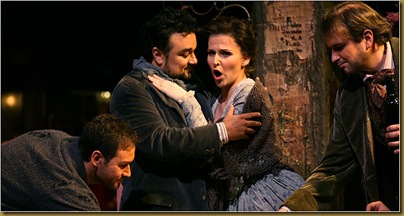I saw the opening night of this season’s La Boheme at the Metropolitan Opera, and while the New York Times gave it a wonderful review, I do take exception to one thing. While the sets and production were wonderful (there was even an ovation for the set itself (without people or music) at the beginning of Act III; a more amazing set is rare at the Met), the animals, lead singers, score, and libretto were all strong, as was the orchestra.
That is the problem. The orchestra (or perhaps the conductor, Frédéric Chaslin) was too strong and twangy at times, drowning out the singers themselves.
La Boheme is known for its wonderful music and singing, yet that does not mean it was always easy to listen to as the orchestra did not work together and then in conjunction with the singers. I noticed this, as did some of the people around me. I wonder why the Times reviewer missed it? Perhaps a lesson here is that the power of the reviewer comes from a specific worldview (or at least section of seating) that may not represent the perspective of everybody.
An important lesson for those of us involved in education and research.

Wonderful food for thought. Students of bureaucratic politics know that “where you stand is where you sit.” As educators we must constantly be attentive to questions of power, privilege, and differential access. Rock on.